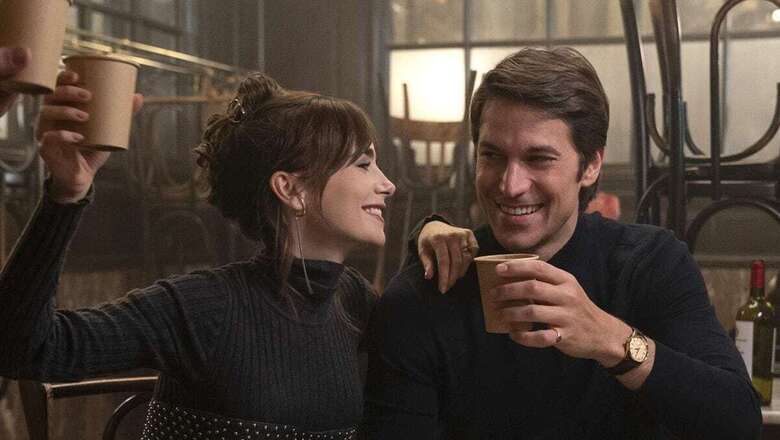
views
Emily in Paris season 4 review: In the myriad of stories about white women choosing between two gorgeous, successful men, Lily Collins’ Emily in Paris no longer has a story left to tell. Four seasons deep, the plot remains elusive, buried beneath berets and baguettes. Part one of the show’s fourth season, released on Netflix on August 15, feels disappointingly half-baked.
The slow-burn romance between Emily (Lily Collins) and the blue-eyed chef Gabriel (Lucas Bravo) finally unfolds in the fourth season. However, after three years of anticipation, their union feels rather uninspired. What begins as a Nora Ephron-esque love affair quickly falls flat due to lazy writing. The tension that once drove the story now seems meaningless, as their casual acknowledgment of feelings renders the previous seasons almost redundant.
When the show first premiered in 2020—at the height of the global pandemic—it served as a sweet, escapist fantasy, not to be taken seriously. Four years later, Emily’s illusory charm has worn thin. Her character has shown no development, and her passionate romance with Alfie (Lucien Laviscount) fizzles out in just three episodes, with Alfie disappearing entirely. Was he ever truly a competitor for Gabriel? After three years of buildup, Gabriel and Emily brush off all conflict with comical convenience.
Emily in Paris is as much about Emily as it is about the people of Paris, and thus, the scope for disappointment is broader. The sexual harassment subplot between Sylvie (Philippine Leroy-Beaulieu) and JVMA CEO Louis de Leon is a major letdown. I don’t expect a show like Emily in Paris to take itself too seriously, but if it touches on such issues, it should do so with some depth. Sylvie, a strong character, is wasted in this half-hearted arc.
While the plot may develop further in the latter part of the season, here it merely serves to establish Louis’ (Pierre Deny) arc, rather than offering any meaningful insight into Sylvie’s character. It becomes a plot device in Mindy and Nicholas’ (Paul Forman) love story, rather than a moment of empowerment for Sylvie.
Mindy (Ashley Park), whose band is selected as the French delegation for Eurovision, never once practices with them. Despite agreeing that they need to busk in two shifts all week to raise money, the only time we see her perform is at a marketing event in a blink-and-you-miss-it sequence.
Camille (Camille Razat), once a headstrong character, loses her sense of self this season. The neglect of her plot development has reduced her from an endearing character to the saddest person in Paris. The only time her story makes sense is when Sofia (Melia Kreiling), her lover, suddenly realizes she’s not ready to move across the world for someone pregnant with another man’s child. Julien (Samuel Arnold) and Emily’s conflict remains unexplored. The only character seemingly enjoying themselves is Luc (Bruno Gouery), who, fittingly, lives in a houseboat.
These complaints are not new. Emily in Paris was never known for its strong writing. Although the show comes from the creators of Sex and the City, this Darren Star venture has always been popular for being—at its core—a show about nothing. While this sense of ‘nothing’ paired with Emily’s sunny disposition was a welcome distraction during the pandemic, it now feels stretched too thin. Emily no longer has anything at stake. Although the performances are commendable, they are overshadowed by the lackluster plot.
To its credit, Emily in Paris remains fun to binge on a dull day, thanks to Lily Collins’ charming delusion and the show’s commitment to doing nothing. Criticising a show like Emily in Paris feels almost pointless. It seemed unnecessary until director Andrew Fleming and writer Joe Murphy made a laughable attempt to delve into deeper narratives. But after five episodes, we’re left exactly where we started—staring at wasted potential. While light-hearted dramedies deserve a generous lens, how much longer can Emily in Paris sustain itself? As I await the release of Part 2 in September, I’d be lying if I said the show had any hope for redemption.


















Comments
0 comment